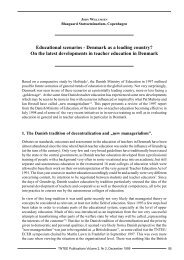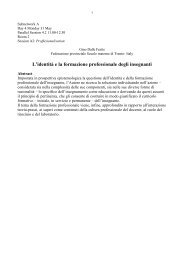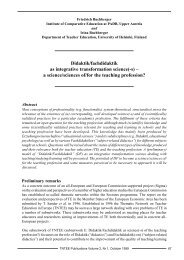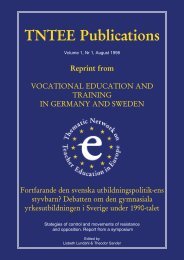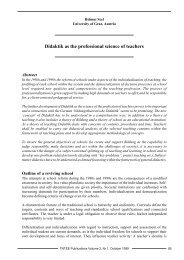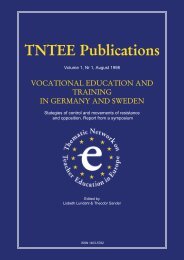TNTEE Publications - Didaktik/Fachdidaktik
TNTEE Publications - Didaktik/Fachdidaktik
TNTEE Publications - Didaktik/Fachdidaktik
Create successful ePaper yourself
Turn your PDF publications into a flip-book with our unique Google optimized e-Paper software.
etween individualistic and social perspectives and secondly that between fragmentation and<br />
integration. The sources of these tensions can be traced back to differing perspectives on teachinglearning<br />
e.g. specialised training in specific skills (in the behaviourist tradition) in contrast with<br />
teaching-learning that is intended to “activate large areas of consciousness” (higher mental functions<br />
in the Vygotskian tradition). In considering developments in England and Wales over recent years,<br />
this is seen as a time of increasing fragmentation in terms of the curriculum in both schools and also<br />
more recently in teacher education. The style and approach of the Chief Inspector is seen to be an<br />
obstacle to constructive engagement with and the future development of the teaching profession<br />
and the, at times, adversarial approach of the Teacher Training Agency is seen to have been<br />
problematic. A further problem at the time of first writing this chapter was seen to be the lack of a<br />
“clear and explicit rationale” for the curriculum that was in sharp contrast with the concept of<br />
Bildung that is central to <strong>Didaktik</strong>. It was encouraging to see this problem being addressed recently,<br />
through a proposed statement of values and aims. However this is now seen quite widely as a rather<br />
timid response on some aspects such as multicultural issues. With regard to pedagogy, the relatively<br />
recent debate in the UK is welcomed although the atheoretical nature of this contribution to the<br />
debate from the Teacher Training Agency is noted and an alternative broader conception is proposed.<br />
The tradition of <strong>Didaktik</strong> is seen to offer real potential for informing future development in educational<br />
policy. In particular this tradition is seen as one which would enable a shift in thinking from a false<br />
dichotomy between teaching and learning and also a shift in emphasis in thinking about the<br />
educational process as being concerned with the development of “higher mental functions” rather<br />
than narrowly conceived technical competences.<br />
Birgit Pepin explores existing models of knowledge in teaching in three different environments: the<br />
Anglo/American; the French; and the German scene in chapter 4. Particular attention is given to<br />
models of mathematics teaching. In each scene it is attempted to develop an understanding of the<br />
different aspects of the models, to comprehend their underlying concepts, how they are constructed,<br />
and in some cases how they developed historically. By doing this, similarities and differences could<br />
be identified. It is concluded, firstly, that what is common to all models in all countries considered<br />
is that knowledge in teaching is not seen as static, but as a process of development and change and<br />
that experience in the classroom contributes to its growth and change. Secondly, there are differences<br />
in terms of origins of concepts related to their background in terms of educational traditions. Thus,<br />
it is argued that models of knowledge in teaching have to be understood in terms of the countries’<br />
educational and cultural traditions in which they developed. It is proposed that this might usefully<br />
guide researchers to the development of a common understanding of what is generally called ‘the<br />
science of teaching’ or ‘didactics’, as well as to the identification of research and development<br />
projects in the areas of teachers’ knowledge. In order to make the task manageable distinctive<br />
models were chosen for the Anglo/American scene, in particular that of Shulman in terms of teachers’<br />
knowledge in general, and that of Ernest in terms of mathematics teaching. For the French scene<br />
particular concepts were selected that originate in the French research on didactics and mathematics<br />
didactics, and these were linked with corresponding didactical theories. For the German scene the<br />
research drew almost exclusively on literature that presented and compared the German concept of<br />
<strong>Didaktik</strong> with the Anglo/American concept of research into teaching and curriculum. Therefore,<br />
the reader is asked to imagine a grid with three lines (Anglo/American; French; and German) and<br />
two rows (general didactics; mathematics didactics) which need to be filled with theories and<br />
concepts. The main emphasis of the paper is on the Anglo/American aspect, simply because in<br />
England the main literature is available in English and it is on the Anglo/American representation<br />
of teacher knowledge. It is argued that there is too little literature available in English on French and<br />
German theories, in order to appreciate the full volume of concepts and ideas of didactics in the<br />
French speaking or the German educational environment.<br />
<strong>TNTEE</strong> <strong>Publications</strong> Volume 2, Nr 1, October 1999 3



